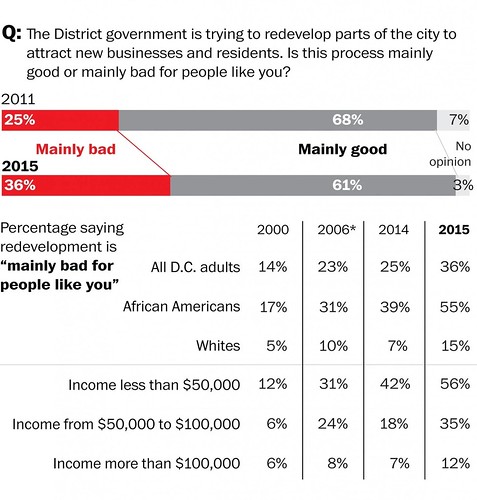Racial differences on the value of new development shown in Washington Post opinion survey miss the point: income differences are what matter, not race
People eating outdoors at the new Busboys & Poets restaurant in DC's Takoma neighborhood.
It happens that I was one of the respondents to the most recent Washington Post poll of DC residents on the state of the city, and I do remember the question about my sense of the value of development to the city.
The Post ran a number of articles on the poll, including "Poll: White residents in D.C. think redevelopment helps them. Black residents don't" which found a difference in the perception of the value of new development in the city.
From the article:
The growth in resistance among African Americans may reflect that redevelopment is no longer a novelty and that the improved services and amenities it attracts to neighborhoods at some point becomes a hardship to poor and working-class residents forced to pay higher property taxes. The District’s transformation began slowly downtown in the 1980s and 1990s and, in more recent years, has accelerated, spreading to neighborhoods such as Columbia Heights, Brookland and Petworth, raising property values and rents and imposing added economic pressure on working and middle-class households.

While it seemingly makes sense to analyze this question/this issue on the basis of race, the reality is that the benefits of development depend more on a household's economic status.
In my middle class neighborhood, which is majority African-American but changing (basically, the majority of housing turnover results in replacing black households with white, Hispanic, or mixed-race households) I don't imagine "African-American households" believe that new development negatively impacts them. People are happy that the new apartment building by the Metro has a Busboys & Poets, etc.
Washington Post photo.
OTOH, the guy in Brightwood with the yard signs against "gentrification" lives not too far away.
But there isn't really gentrification in our neighborhood based on the strict definition of lower income households being displaced by higher income households, as much as it is about demographic change. See "Is gentrification racial or an economic class issue?."
Or maybe he is right in that there is displacement of middle income households by higher income households. But except for some discussion in academia about super-gentrification (e.g., the work by Loretta Lees), traditionally there isn't much sympathy for the displacement of households earning $125,000 or more. Also see "Exogenous market forces impact DC's housing market."
Because middle class African American households are still leaving the city at higher rates than in-migration of similar households, and lower income African American households are likely to not be moving, likely a sample of African-Americans in such a survey over-represents lower income African American households.
For households less well armed to compete in a market economy, new development contributes to an upward pricing of housing and the purchase cost of goods and services and the partaking of newly available amenities--e.g., yoga shops, fitness places like SoulCycle, expensive restaurants, the difference between the upscale "Union Market" vs. what it replaced, a food market building focused on serving low income audiences, Whole Foods and Yes Market, etc.
The thing that people may not be conscious of is a long term restratification within the city of households by income, which will end up, in the long run, displacing less well off "white people" too, because to compete for houses in the city, households will have to earn much more money in order to compete for housing, probably a minimum annual income of at least $200,000 is required.
At Connecticut Avenue and Calvert Street in Woodley Park.
To buy a house in high demand neighborhoods, a household needs an income of at least $250,000 to be able to buy a million dollar house. That's at extremely low interest rates.
As interest rates rise, so too will household incomes need to rise in order to be able to buy (e.g., $375,000 household income to buy a million dollar house at mortgage interest rates of 6%).
If you are fortunate to have bought a house before 2008, and if so you didn't do too much cash out based refinancing, as long as property taxes don't rise too quickly, you're set to be able to participate in DC's economy. But the likelihood of being able to sell and buy elsewhere in the city is significantly reduced, unless your household income is $200,000 or more.
In the meantime, the addition of new housing to many neighborhoods has resulted in the concomitant development of and support of new retail and food options, which mostly are welcomed.
However, these places are repricing upwards also--at least for restaurants--and all too frequently the price-value equation is negative. (Each bad overpriced meal that I consume encourages me to cook more at home...)
Labels: demographics, gentrification, invasion-succession theory, low income households, urban sociology







1 Comments:
Thank you again for your flawless service, and I look forward to working with you in the future.
Post a Comment
<< Home